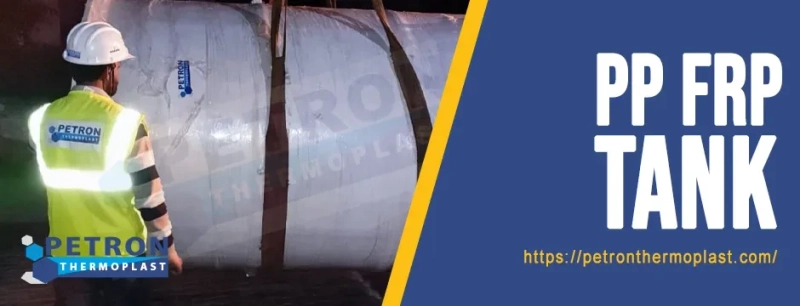Polypropylene (PP) Fiber Reinforced Plastic (FRP) tanks are innovative storage solutions designed to handle highly corrosive materials and harsh environmental conditions. Combining the chemical resistance of polypropylene with the strength of fiberglass reinforcement, the PP FRP Tank offer numerous advantages and are used in a variety of industrial applications.
Properties and Advantages of PP FRP Tanks
1. Excellent Chemical Resistance: PP FRP tanks are highly resistant to a wide range of chemicals, including acids, alkalis, and solvents. This makes them ideal for storing corrosive substances without risk of degradation.
2. Structural Strength and Durability: The fiberglass reinforcement in these tanks provides exceptional mechanical strength and durability. They can withstand high pressures and impacts, ensuring a long service life even in demanding conditions.
3. Lightweight Construction: Despite their strength, PP FRP tanks are relatively lightweight compared to metal tanks. This facilitates easier transportation, handling, and installation, reducing overall operational costs.
4. Thermal Stability: These tanks can operate effectively across a broad temperature range. PP\'s inherent thermal stability, combined with the insulating properties of FRP, allows the tanks to handle temperature variations without compromising structural integrity.
5. Cost-Effectiveness: PP FRP tanks offer a cost-effective solution due to their long lifespan, minimal maintenance requirements, and resistance to corrosion, which reduces the need for frequent replacements or repairs.
6. Customizability: Manufacturers can customize PP FRP tanks in various sizes, shapes, and configurations to meet specific industrial needs. This versatility ensures that the tanks can be tailored to fit unique storage requirements.
Use Cases and Industrial Applications
PP FRP tanks are utilized in a wide array of industries due to their robustness and adaptability:
1. Chemical Processing: The chemical resistance and durability of PP FRP tanks make them perfect for storing and transporting corrosive chemicals, acids, and reactive substances commonly used in chemical processing plants.
2. Water Treatment: In water and wastewater treatment facilities, these tanks are used for storing and processing various chemicals required for water purification and treatment processes.
3. Pharmaceutical Industry: The high purity and non-reactive nature of PP FRP tanks are essential for storing sensitive chemicals and pharmaceutical ingredients, ensuring product integrity and safety.
4. Food and Beverage: These tanks can safely store and handle various food-grade chemicals and liquids. Their resistance to contamination and ease of cleaning are critical in maintaining hygiene standards.
5. Mining and Metallurgy: In mining operations, PP FRP tanks are used to store and transport aggressive chemicals used in mineral processing and metal extraction, withstanding harsh mining environments.
6. Agriculture: They are used for storing fertilizers, pesticides, and other agricultural chemicals, providing a reliable and safe storage solution that prevents chemical degradation and leakage.
Essential Points for Consideration
1. Installation and Maintenance: Proper installation is crucial to ensure the longevity and performance of PP FRP tanks. Regular inspection and maintenance, although minimal, are recommended to ensure optimal functionality and safety.
2. Compatibility: While PP FRP tanks are resistant to many chemicals, it is important to verify the compatibility of the specific chemicals being stored to prevent any potential reactions or degradation.
3. Standards and Certifications: Ensure that the tanks comply with industry standards and certifications to guarantee quality, safety, and regulatory compliance. Working with reputable manufacturers who adhere to these standards is essential.
4. Environmental Impact: PP FRP tanks are environmentally friendly due to their long service life and resistance to leaks and corrosion, which minimizes the risk of environmental contamination.
Conclusion
PP FRP tanks represent a superior solution for storing and handling corrosive and high-purity substances across various industries. Their combination of chemical resistance, structural strength, and cost-effectiveness makes them a preferred choice for many applications. By selecting high-quality PP FRP tanks and ensuring proper installation and maintenance, industries can achieve reliable, long-term storage solutions that enhance operational efficiency and safety.



